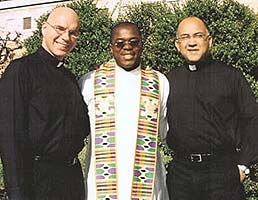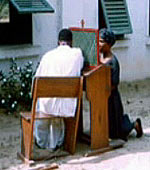|
|

|
FAQ (Frequently Asked Questions)
What is the purpose of the MPD Self-Assessment Survey?
Vocations Placemenent is a ministry with
one mission, which is to replenish every
religious community and diocese in the
U.S. and Canada with dedicated persons
who find joy and their ultimate fulfillment
in serving Christ as a monk, brother, nun,
sister, friar, or priest. The VPS makes
the MPD Self-Assessment
Survey available as a tool to encourage
those discerning God's call in their life.
The MPD Self-Assessment
Survey is designed to "sow
the seeds" of spiritual enlightenment
for the future harvest of potential priestly
and religious vocations as well as
lay leadership within the Church. It
can be used by dioceses, religious communities
and other vocational organizations to
help identify candidates who have an
expressed interest in and aptitude for
the priesthood, sisterhood or brotherhood.
How does the MPD help identify these potential candidates?
The primary method of identification is through
a comprehensive 39-question survey for grade
school students, high school students, college
students and young adults. The MPD Self-Assessment
Survey has been tested for its efficiency
and reliability and is recognized as a powerful
instrument of discernment among Church leaders
throughout the United States. This discernment
tool is not a psychological test. Rather
it is a testing instrument based on the foundational
principles of spiritual theology. The survey
is primarily designed to be used as a mass
testing instrument in schools, CCD programs
and youth groups.
How does it work?
After reading each statement, respondents mark the degree to which they agree or disagree with the statement. The statements are organized into six categories: Self, Others, My Family, God and Religion, My Life and Destiny, and My Personal Life. For example, in the My Life and Destiny category, one of the statements reads: "I do want to find out if God has given me special talents to be of service to others." A strong agreement with such a statement may indicate a possible interest in a priestly or religious vocation. Scores on certain statements rank a student from a modest to strong interest in the priesthood or religious life. A numerical score is calculated based on the degree of agreement or disagreement with the individual questions. The numerical scores can be interpreted this way:
♦ 500+ Strong potential
♦ 400-499 Moderate potential
♦ 300-399 Slight potential
When was this survey first developed?
Fr. James Lauerman, International Director of Discernment Services at Cardinal Muench Seminary in Fargo, N.D., developed this vocational assessment tool during the mid-1980s to facilitate the process of vocation guidance. It has proven successful enough that other diocesan vocation directors, religious communities, Catholic youth organizations and others have incorporated it into their promotion of vocations and readily endorse it as a most effective tool.
Can you cite examples of how it is currently being utilized?
About ten years ago, the MPD self-assessment survey was implemented in hundreds of Catholic schools throughout the country. Over 200 elementary schools in the Chicago Archdiocese have used the survey in the past. The Archdiocese of Philadelphia surveys students in its Catholic high schools and MPD selected candidates are then personally interviewed. Ideally, it is utilized as part of a "feeder system" to identify candidates for potential vocations or enrollment in a seminary or candidacy program. At the 1999 St. Louis National Youth Convention, 5000 young people completed the survey and 1198 showed strong interest in a priestly or religious vocation. Results were sent to over 100 vocation directors and youth ministers. The same thing was done at the Kansas City National Youth Convention in 1997 with similar results.
Has the Church embraced this instrument nationally?
Yes, the Church has embraced it nationally. A few years ago, the vocation committee of the United States Conference of Catholic Bishops recommended the MPD Self-Assessment Survey in its national vocation strategy, Future Full of Hope. As a result, interest in use the MPD has increased. With the recent updating of its software and website, the MPD can now be administered online very easily and will fit into a wide variety of vocation promotion strategies at the diocese, parish and school levels.
 Who can be given the MPD Self-Assessment Survey? Who can be given the MPD Self-Assessment Survey?
The survey is administered online and is appropriate for students in junior high or high school, as well as those of college age or beyond, and can be completed in less than 20 minutes. After the questionnaires are scored, each respondent receives his or her score via a personalized e-mail letter. Depending upon the scoring of the survey, there are approximately 250 variations of computerized responses that highlight key strength and growth areas. In addition, individual and group results are tabulated and can be sent to vocational contacts. This allows vocation directors, youth ministers, pastors, pastoral associates or others to personally contact the students to extend an explicit invitation for the young person to seriously consider a vocation. Once identified as potential candidates for ministry, young men and women must be explicitly encouraged, invited and asked to consider a life dedicated to God.
Why is the MPD Survey an important tool for vocational discernment?
The MPD self-assessment survey provides the first step on the vocation track: identification of the candidate. It helps young people to sort through their thoughts, goals and ideals, and then lets them see in black and white that, yes, they do (or do not) possess a strong interest in or aptitude for the priesthood or religious life. It makes follow-up of candidates easier because the best potential candidates have been identified. It's exciting, to help someone recognize his or her potential and take that first step toward such a noble calling.
Who follows up on the survey?
Various persons or organizations may follow-up on the survey, but they are always individuals who respect the confidentiality of those surveyed. In many cases, vocation directors from a particular diocese or religious community may make personal contact, but teachers, principals and other qualified individuals may also be involved in some aspect of the discernment process, depending upon who is sponsoring the testing effort. Occasional notices and other vocation-related information such as retreats or helpful resources may be sent to individuals via e-mail.
Do similar instruments exist? If so, are they successful?
We believe there is no other such vocational testing instrument that is as simple, low-cost, and effective. Other instruments that might be considered similar are far more subjective and less adaptable to mass screening of young people. Their complexity adds to both cost and time — two scarce resources in the Church.
Besides identifying potential vocations, can the MPD survey be used in other ways, for other purposes?
Yes. This instrument was originally developed as a means of identifying young people with ministry potential. Religion teachers, principals and directors of religious education who used it also found it was valuable in measuring students' acceptance of core Christian beliefs and assessing the effectiveness of religious education. Many schools have used it primarily as an indicator of religious development, while identifying vocational candidates as a secondary benefit. For example, the survey asks how strongly the survey taker agrees with this statement: "Obedience to each of the Ten Commandments is just as necessary as becoming a loving and caring person." A young person's response to this can indicate his or her maturity in understanding fundamental moral principles.
How can someone get more information on the MPD?
Persons interested in obtaining more information
can contact
Natalie Smith at NSmith@vocationsplacement.org
or call 800-221-1807.
|

|













 Who can be given the MPD Self-Assessment Survey?
Who can be given the MPD Self-Assessment Survey?